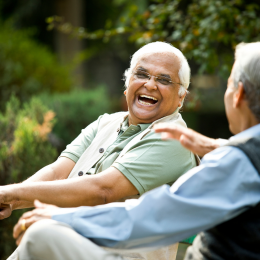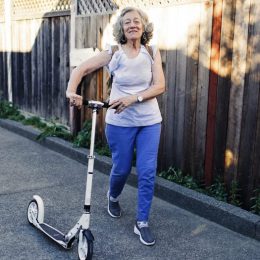5 Ways to Fall and Stay Asleep—Starting Tonight!
Reap the many benefits of being well rested with these tips.

Health experts may debate the benefits of red meat or the best time to exercise, but there’s one thing they all agree on: Sleep is incredibly important.
Getting a good night’s rest is tied to a slew of health benefits, including better brain function, quicker reflexes, and an improved mood. On the flip side, an ongoing sleep deficit can increase your risk for obesity, heart disease, and depression.
The research is convincing, but here’s the thing: Simply knowing why you should get quality sleep isn’t enough to make it happen, especially as you get older. Certain sleep disruptors tend to hit later in life, including muscle and joint pain, sleep apnea, and acid reflux. Your body also creates less of the sleep hormone melatonin as you age.
All of this can make falling and staying asleep more difficult—but not impossible. There are things you can do today to up your chances of drifting off into a deep, restful sleep tonight. Try the following strategies.
Sleep Tip #1: Eat Your Spinach
Your body’s ability to absorb and use the nutrients you eat lessens with age. So unless you’re making a concerted effort to increase your intake of key nutrients, you’re likely falling short—and your sleep may be suffering as a result.
Magnesium has a particularly strong link to sleep quality, says Eugene Babenko, D.P.T., a physical therapist and biomechanical specialist in the realm of sleep. Magnesium helps calm your nervous system, preparing your mind and body for deep, restful sleep.
In one study of older adults with insomnia, magnesium had a positive effect on overall sleep quality, including the length of time they slept and their ease in waking up. The same study found that magnesium boosted levels of renin and melatonin, two hormones that help regulate sleep.
While the researchers used magnesium supplements, start by adding more magnesium-rich foods into your diet. Green leafy vegetables, nuts, seeds, whole grains, fish, and yogurt are all great sources. One cup of cooked spinach delivers 40 percent of the recommended daily value.
If changing your diet doesn’t seem to help, a supplement (up to 350 mg) might be your best bet. As always, check with your doctor before starting any new supplement.
Sleep Tip #2: Foam Roll Before Bed
Any activity that helps soften and loosen up the muscles will help your body prepare for sleep. Additionally, stretching before bed may reduce leg cramps and muscle discomfort that can disrupt sleep.
“Some kind of stretching, foam rolling, or soft tissue work can help signal sleeping hormones,” Babenko says. “This can be as simple as putting a golf ball or tennis ball on the floor and rolling it around the sole of your foot as you stand on it.”
You can also use self-massage tools like The Stick or a tennis ball to roll along your thighs and loosen up the quads up to one hour before bed.
Sleep Tip #3: Remove All the Lamps
Okay, getting rid of all light from the bedroom may seem extreme, but you get the point: Exposure to electrical lights between dusk and bedtime can negatively affect your chances at quality sleep.
“Our sleep cycle is the most natural when it lines up with the light cycle outside,” Babenko says. “So once the sun goes down, if we’re still being exposed to all this light, it can be troubling for our sleep patterns.”
Assuming you don’t want to sit in the dark for hours, find the happy medium by dimming the lights as bedtime draws near. Also, consider changing your light bulbs to soft or warm varieties with a color temperature less than 3000 Kelvin (3000k), all of which can reduce the effects of lights on your nervous system.
And don’t forget about the artificial light emitted by electronics, or blue light. A study published in Applied Ergonomics found that two hours of exposure to a bright tablet screen after dark reduced melatonin levels by about 22 percent. Turn off your TV, computer, and other devices at least one hour before bed to avoid sleep disturbances.
Subscribe to our newsletter
It's quick and easy. You could be one of the 13 million people who are eligible.
Already a member? Click to discover our 15,000+ participating locations.
Follow Us
Sleep Tip #4: Don’t Get Into Bed Until You’re Tired (or Frisky)
“Your bed should only be used for sleep and sex,” says Frank Tedeschi, M.D., a board-certified psychiatrist and neurologist in New York City. “Don’t do work, watch TV, or do any other things that are associated with a wakeful state because then the bed starts to become associated with being awake.”
When you fall into the sack, you want your body to immediately realize that this is the place that’s designated for sleep. Don’t interfere with that connection.
Sleep Tip #5: Embrace Being Wide Awake
You can try all of these tactics, but if sleep simply doesn’t come when you’re lying in bed with your eyes closed, it’s not always a good idea to force it.
“Get up and do something for 15 to 20 minutes, then get back into bed,” Dr. Tedeschi says. “Remember that you want your brain to associate your bed with sleep, not wakefulness. And the longer you lay awake in bed, the more you’ll associate it with being awake.”
Consider heading to the couch to meditate or listen to soothing music. You can also try progressive muscle relaxation, which has been found to help people with insomnia fall and stay asleep. Here’s how to do it: Starting with the feet, tense your muscles for a count of five, and then relax. Do this for every muscle group in the body, working up from the feet to the top of the head. Once you finish, head back to bed.
Check Your SilverSneakers Eligibility Instantly
SilverSneakers members can go to thousands of gyms and fitness locations across the nation, plus take exercise classes designed for seniors and led by supportive instructors. If you have a Medicare Plan, it may include SilverSneakers—at no additional cost. Check your eligibility instantly here.
Already a member? Get your SilverSneakers member ID and exclusive fitness content by logging in to or creating your online account here.





